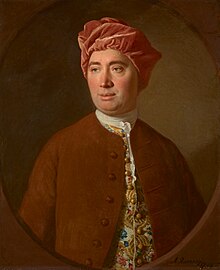Criticism of monotheism: Difference between revisions
New section |
reference |
||
| Line 6: | Line 6: | ||
==Meaning of critique or criticism== |
==Meaning of critique or criticism== |
||
"The term 'critique' [or 'criticism'] entails the critical and technical analysis of issues [that are] intended to outline the positive and negative angles to such issues." |
"The term 'critique' [or 'criticism'] entails the critical and technical analysis of issues [that are] intended to outline the positive and negative angles to such issues."<ref name="okoch">{{cite journal|last1=Okoro|first1=Chiedozie|title=Theistic Humanism and the Critique of Monotheism as the Most Evolved Religion|journal=Open Journal of Philosophy|date=February 25, 2013|volume=3|page=67|doi=10.4236/ojpp.2013.31A011|url=https://file.scirp.org/pdf/OJPP_2013022516315567.pdf}}</ref> |
||
==Contradictions== |
==Contradictions== |
||
Revision as of 03:04, 6 August 2017
| This article is of a series on |
| Criticism of religion |
|---|
This article's lead section may be too short to adequately summarize the key points. (September 2016) |
Criticism of monotheism has occurred throughout history. Mark S. Smith, an American biblical scholar and ancient historian, currently teaching at the Princeton Theological Seminary, wrote that Monotheism has been a "totalizing discourse", often co-opting all aspects of a social belief system, resulting in the exclusion of "others".[1] Accusers have painted monotheism as a cause of ignorance, oppression, and violence.
Meaning of critique or criticism
"The term 'critique' [or 'criticism'] entails the critical and technical analysis of issues [that are] intended to outline the positive and negative angles to such issues."[2]
Contradictions
Through the means of defining, it is traditionally agreed among the major monotheistic religions that the one God is, inter alia, omnipotent, omniscient, and omnibenevolent. However, one scholar argues that "this definition of God [is] contradictory to what has been perceived by us in the empirical world."[3]
Feminist thinkers have criticized the monotheistic concept as the model of the highest form of patriarchal power. They argue that the one god is regarded to be male and opposed to everything related to change, sensuality, nature, feeling, and femininity.[4]
Forcing one belief

David Hume (1711-1776) argues that monotheism is less pluralistic and thus less tolerant than polytheism, because monotheism stipulates that people pigeonhole their beliefs into one tenet. [5] In the same vein, Auguste Comte argues, "Monotheism is irreconcilable with the existence in our nature of the instincts of benevolence" because it compels followers to devote themselves to a single Creator.[6] Jacob Neusner suggests that "the logic of monotheism ... yields little basis for tolerating other religions". [7]
James Lovelock criticized monotheism due to its idea of a transcendent almighty father; he says about monotheism that it "seems to anesthetize the sense of wonder as if one were committed to a single line of thought by a cosmic legal contract".[8]
Violence in monotheism
In modern times, ancient monotheism is blamed[by whom?] as the instigator of violence in its early days as it inspired the Israelites to wage war upon the Canaanites who believed in multiple gods.[9]
Sarvepalli Radhakrishnan regarded monotheism to be one reason for violence; he said:
The intolerance of narrow monotheism is written in letters of blood across the history of man from the time when first the tribes of Israel burst into the land of Canaan. The worshippers of the one jealous God are egged on to aggressive wars against people of alien [beliefs and cultures]. They invoke divine sanction for the cruelties inflicted on the conquered. The spirit of old Israel is inherited by Christianity and Islam, and it might not be unreasonable to suggest that it would have been better for Western civilization if Greece had moulded it on this question rather than Palestine.[10]
Success of monotheistic religions
Bertrand Russell has stated that in recent history, William James popularized the idea that the belief in one god causes people to refrain from improper behavior. Furthermore, Russell expostulates through examples that whether "politicians and educators ought to try to make people think there is one [god]" and that it is "a political one" since one cannot prove the moralistic argument of William James.[11]
See also
References
- ^ Smith, Mark S."The Origins of Biblical Monotheism: Israel's Polytheistic Background and the Ugaritic Texts", (August 2001). p. 11. Oxford University Press. (Google Books).
- ^ Okoro, Chiedozie (February 25, 2013). "Theistic Humanism and the Critique of Monotheism as the Most Evolved Religion" (PDF). Open Journal of Philosophy. 3: 67. doi:10.4236/ojpp.2013.31A011.
{{cite journal}}: CS1 maint: unflagged free DOI (link) - ^ Worship as a Hindrance to Self
- ^ Encyclopedia of religion - Volume 9 - Page 6161, by Lindsay Jones
- ^ "David Hume argued that unlike monotheism, polytheism is pluralistic in nature, unbound by doctrine, and therefore far more tolerant than monotheism, which tends to force people to believe in one faith." [1]
- ^ The Catechism of Positive Religion, page 251
- ^
Berchman, Robert M. (2008). "The Political Foundations of Tolerance in the Greco-Roman Period". In Neusner, Jacob; Chilton, Bruce (eds.). Religious Tolerance in World Religions. Templeton Foundation Press. p. 61. ISBN 9781599471365. Retrieved 2016-07-03.
Jacob Neusner [...] claims that 'the logic of monotheism ... yields little basis for tolerating other religions.'
- ^ "A Reenchanted World: The Quest for a New Kinship with Nature", by James William Gibson, p. 98, Publisher = Macmillan, Year = 2009
- ^ The Curse of Cain: The Violent Legacy of Monotheism ISBN 978-0-226-74199-4
- ^ "A Primal Perspective on the Philosophy of Religion", by Arvind Sharma, page 29
- ^ Is There a God?,(Commissioned by Bertrand Russell, but never published in, Illustrated Magazine, in 1952) "Archived copy". Archived from the original on July 20, 2013. Retrieved July 20, 2013.
{{cite web}}: Unknown parameter|deadurl=ignored (|url-status=suggested) (help)CS1 maint: archived copy as title (link)
